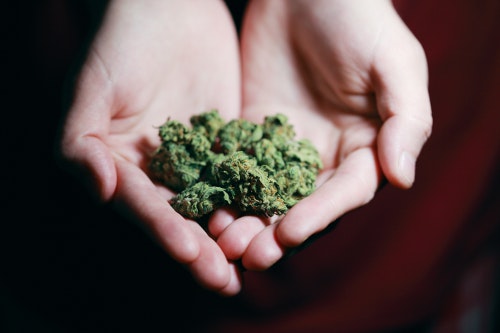Key Takeaways –
- Addiction to various substances, including alcohol and opioids, can be a debilitating condition that mentally and physically affects individuals.
- Research into the potential of cannabis as a treatment for substance abuse has been limited due to its status as an illegal drug in many countries.
- However, some evidence suggests that cannabis may help alleviate symptoms of addiction by reducing the intensity of cravings and helping to reduce withdrawal symptoms.
- Further research is needed to fully assess the potential of cannabis in treating substance abuse. Still, in the meantime, it is important for individuals considering using cannabis as an adjunct treatment for addiction to do so under medical supervision.
In the United States, millions of individuals grapple with various forms of addiction. Substance abuse has become an alarming concern, affecting people from all walks of life and casting a shadow over their well-being.


As we search for effective solutions to combat this pervasive issue, an intriguing question emerges: Could cannabis hold potential as a treatment for addiction?
In this informative blog, we delve into the captivating realm of cannabis and its potential therapeutic effects on substance abuse. We aim to explore the scientific evidence surrounding this topic, providing authoritative insights in a friendly and engaging manner.
So, let’s embark on this informative expedition, exploring the fascinating intersection of cannabis and addiction and discovering what the current scientific landscape has to say about its potential as a transformative treatment for those affected by substance abuse.
Understanding Substance Abuse and Addiction
Substance abuse is the harmful or excessive use of substances such as drugs or alcohol, often leading to negative consequences on physical, mental, and social well-being.
Conversely, addiction is a complex condition characterized by compulsive drug-seeking and use, despite harmful consequences. It involves changes in the brain’s reward circuitry, leading to a loss of control over substance use.
Substance abuse and addiction can impact individuals from all backgrounds, and understanding these terms is crucial in addressing and treating these issues effectively.
Pro Tip: Remember that addiction is a complex condition, and it’s important to seek medical help if you or someone you know is struggling with any form of substance abuse or addiction.
The Science Behind Cannabis and Addiction
Neurobiological Mechanisms of Addiction
The neurobiological mechanisms underlying addiction involve various brain regions and neurotransmitter systems. This subheading explores these mechanisms and how cannabis may interact with them.
- Reward Pathway: The brain’s reward pathway, primarily involving the neurotransmitter dopamine, plays a crucial role in addiction. Cannabis compounds, such as THC, can activate this pathway, potentially influencing reward processing and reinforcing addictive behaviors.
- Endocannabinoid System: The endocannabinoid system, present throughout the brain and body, interacts with cannabinoids found in cannabis. This system modulates various processes, including reward, motivation, and stress response, which are closely linked to addiction.
- Neuroplasticity: Addiction can lead to neuroplastic changes in the brain, altering the structure and function of neural circuits. Cannabis compounds, like CBD, have shown potential in modulating neuroplasticity, which could affect addiction treatment.
The Role of Cannabis in Alleviating Withdrawal Symptoms
Withdrawal symptoms can be significant barriers to overcoming addiction. This subheading explores how cannabis may play a role in alleviating these symptoms.
- Symptom Management: Cannabis compounds have been studied for their potential to mitigate withdrawal symptoms associated with various substances, including opioids, alcohol, and nicotine. They may relieve anxiety, insomnia, nausea, and cravings.
- Substitution Therapy: Some researchers suggest that cannabis can act as a substitution therapy, providing a less harmful alternative to substances of abuse. By reducing the severity of withdrawal symptoms, cannabis may assist individuals in transitioning away from more harmful substances.
Potential Effects of Cannabis on Craving and Relapse Prevention
Cravings and the risk of relapse pose significant challenges in addiction recovery. This subheading explores the potential effects of cannabis on craving reduction and relapse prevention.
- Craving Reduction: Preliminary research suggests that certain cannabis compounds, particularly CBD, may reduce drug cravings and cue-induced cravings in individuals with substance use disorders. These effects may help individuals resist triggers that contribute to relapse.
- Relapse Prevention: Cannabis may influence neural processes involved in relapse, such as drug-associated memories and impulsivity. By modulating these processes, cannabis compounds could potentially reduce the risk of relapse in individuals recovering from addiction.
It’s important to note that while initial research shows promise, more studies, including clinical trials, are needed to understand better the specific mechanisms and effectiveness of cannabis in addressing addiction.
Furthermore, individual responses to cannabis-based treatments may vary, highlighting the need for personalized approaches and careful monitoring.
Challenges and Controversies Surrounding Cannabis as a Treatment


Exploring the challenges and controversies surrounding cannabis as a treatment, this section delves into the legal and regulatory hurdles, concerns about addiction transfer, strain variability, and the importance of further research and clinical trials.
- Legal and regulatory hurdles: Varying cannabis laws and regulations pose challenges to accessing and utilizing it as an addiction treatment.
- Concerns about cannabis addiction: Some worry that cannabis use may replace one addiction with another, necessitating careful monitoring and personalized treatment approaches.
- Variability in strains and dosages: The diverse range of cannabis strains and cannabinoid concentrations complicates determining optimal treatment options, calling for standardization and quality control.
- Need for further research: More research and clinical trials are necessary to establish the safety, efficacy, and best practices for using cannabis as a substance abuse treatment.
Risks and Side Effects of Cannabis Use
Physical Risks and Side Effects:
- Respiratory Issues: Smoking cannabis can lead to respiratory problems, such as chronic bronchitis or lung irritation, similar to tobacco smoke.
- Cardiovascular Effects: Cannabis use may cause an increase in heart rate, blood pressure, and the risk of heart-related complications, particularly in individuals with pre-existing cardiovascular conditions.
- Impaired Coordination and Motor Skills: Cannabis use can result in temporary impairment of motor skills, coordination, and reaction time, which may increase the risk of accidents or injuries.
- Cognitive Impairment: Heavy and long-term cannabis use may impact cognitive function, including memory, attention, and problem-solving abilities, especially in individuals who started using cannabis at a young age.
Emotional Risks and Side Effects:
- Psychological Dependence: Cannabis use can lead to psychological dependence, where individuals may feel a strong desire or compulsion to use cannabis regularly, potentially impacting their daily functioning and overall well-being.
- Mental Health Issues: Some individuals may experience an increased risk of developing or exacerbating mental health conditions, such as anxiety disorders, depression, or psychosis, particularly in those predisposed to these conditions.
- Impaired Learning and Motivation: Frequent cannabis use, especially in heavy doses, may impact motivation and hinder learning and academic or professional performance.
- Withdrawal Symptoms: Discontinuing or reducing cannabis use after a period of heavy and prolonged use can lead to withdrawal symptoms, including irritability, anxiety, sleep disturbances, and changes in appetite.
Conclusion
In conclusion, the topic of cannabis and its potential for treating substance abuse is a complex and evolving field. While scientific research suggests that cannabis may hold promise as a treatment option, it is crucial to approach this subject with caution and further investigation.
Cannabis use carries potential risks and side effects, both physically and emotionally, which need to be carefully considered. Additionally, legal and regulatory challenges surrounding cannabis further complicate its use as a treatment for addiction.
Moving forward, continued research, clinical trials, and an evidence-based approach will be essential in determining the true potential of cannabis in addressing substance abuse.
Keep in mind that you should only receive cannabis products from reputable sources such as Dube Delivery dispensary.


























